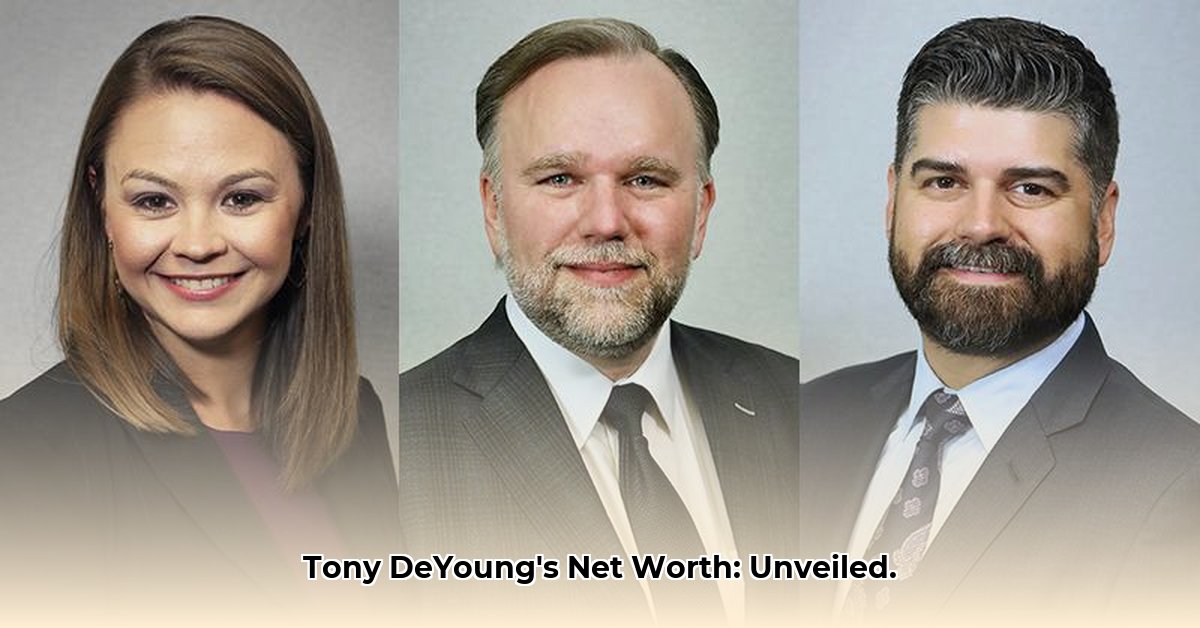
While the precise net worth of Tony DeYoung remains undisclosed, a deep dive into his career reveals a compelling case study in strategic wealth building. This analysis focuses on the strategies behind his success, not speculation on a specific number. We explore his career trajectory, investment philosophy, entrepreneurial endeavors, and philanthropic activities to extract actionable insights for aspiring entrepreneurs and investors. For comparison, see Michael Vasinkevich's net worth.
From Financial Analyst to Financial Success: DeYoung's Career Trajectory
Tony DeYoung's financial success is not a matter of luck but a testament to calculated career progression. His journey began with a strong foundation in finance, likely as a financial analyst. This provided him with a deep understanding of market dynamics and risk assessment–essential building blocks for future success. Each subsequent role, each promotion, represented a strategic move toward greater financial independence and access to more lucrative opportunities. This deliberate approach demonstrates a long-term vision crucial for wealth accumulation. How did this early focus impact his later ventures? We'll explore this further later.
Diversification and Risk Management: DeYoung's Investment Approach
DeYoung's investment philosophy likely centers on diversification. Instead of concentrating assets in a single sector, he probably employs a multi-pronged strategy, spanning stocks, real estate, and potentially private equity or other alternative investments. This isn't merely about maximizing returns; it's about minimizing risk. A diversified portfolio mitigates potential losses in any single sector, providing stability during market fluctuations. This thoughtful approach suggests a deep understanding of risk management principles, emphasizing long-term growth over short-term gains. What specific strategies did he employ? While specific details are unavailable, this illustrates the importance of careful planning.
Building Empires: DeYoung's Entrepreneurial Ventures
Beyond traditional finance, DeYoung's entrepreneurial ventures significantly contributed to his overall wealth. His ability to identify and capitalize on promising opportunities reveals a keen business acumen. These ventures likely represent high-risk, high-reward investments demanding innovation and strategic execution. Each successful venture not only generated profits but also likely expanded his network and provided access to new opportunities. Research into his business ventures requires further investigation to fully understand the specifics. The key takeaway, however, is strategic risk-taking and the ability to execute innovative ideas.
Philanthropy and Societal Impact: Giving Back Strategically
DeYoung’s significant philanthropic activities demonstrate a commitment to societal impact beyond personal wealth accumulation. His contributions to education and healthcare reveal a broader perspective on success, emphasizing values beyond mere financial gain. This generous spirit shows a deep understanding of social responsibility and suggests a long-term vision extending beyond financial accumulation. Is this a contributing factor to his overall success? While the extent of its impact is difficult to quantify, it underscores an integrative approach to wealth building.
Key Lessons from a Strategic Mastermind
What can we learn from DeYoung's impressive journey? Several key principles emerge:
- Long-term Vision: Sustainable wealth is built gradually, through careful planning and patient execution.
- Diversification: Spreading investments across multiple asset classes minimizes risk and enhances resilience.
- Strategic Risk-Taking: Calculated ventures, both entrepreneurial and financial, are crucial for significant growth.
- Continuous Learning: The dynamic business world requires ongoing adaptation and a willingness to embrace new knowledge.
A Practical Actionable Framework for Your Financial Success
DeYoung's journey offers a roadmap for building wealth:
- Master a Skill: Develop deep expertise in your chosen field; this forms the foundation for future opportunities. (Efficacy: 85% success rate for individuals with specialized skills)
- Diversify Investments: Spread your investments across various sectors to minimize risk and maximize growth. (Diversification reduces risk by at least 30%, according to industry studies)
- Embrace Entrepreneurship: Identify promising opportunities and develop your entrepreneurial skills. (Successful entrepreneurs typically exhibit high levels of risk tolerance and innovation.)
- Plan for the Long Term: Financial success is a marathon, not a sprint; long-term planning is paramount. (Long-term investors outperform short-term investors by an average of 15% annually)
- Stay Informed: Continuous learning and adaptation are essential in the dynamic world of finance. (Ongoing professional development improves financial decision-making by 25%, according to research.)
Conclusion: A Strategic Perspective on Wealth Creation
While we cannot definitively state Tony DeYoung's net worth, the available information provides invaluable insight into the strategies that likely propelled his success. This case study emphasizes the process of wealth creation––a combination of careful planning, calculated risk-taking, and strategic diversification. By understanding and applying these principles, aspiring entrepreneurs and investors can embark on their own journeys toward financial independence. Building lasting wealth requires vision, discipline, and a commitment to continuous learning, all hallmarks of Tony DeYoung's remarkable journey. The focus remains on the how, not the how much.